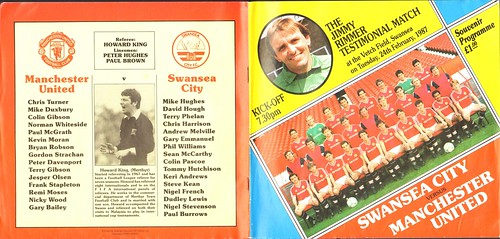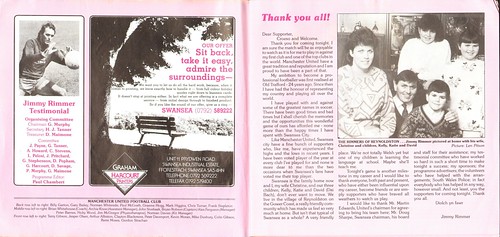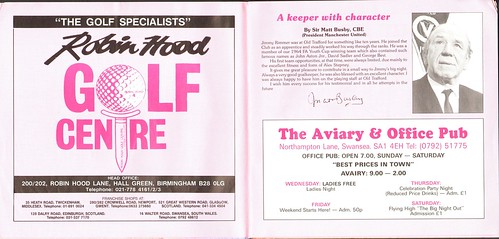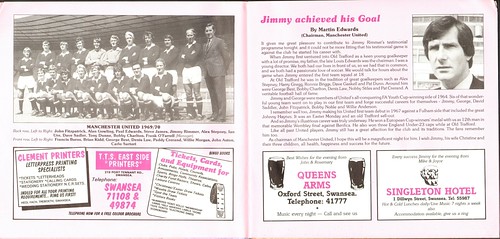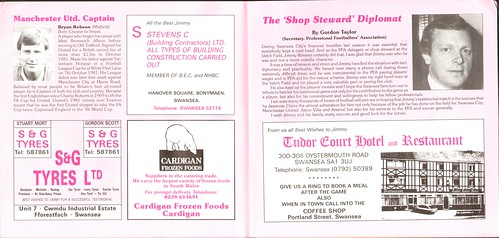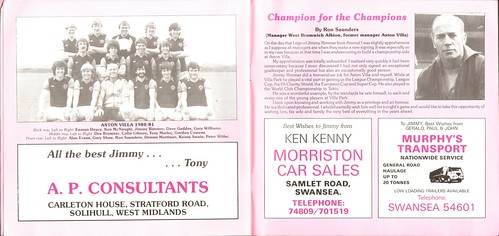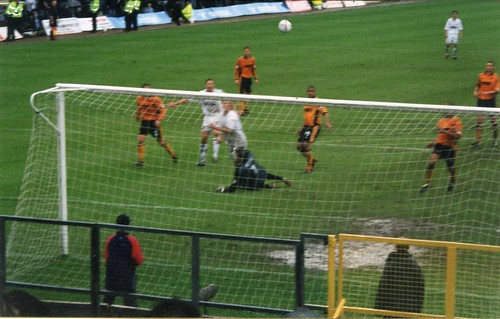Jimmy Rimmer testimonial. Swansea City v Manchester United 24 February 1987
Category Archives: players
Jimmy Rimmer Testimonial
Filed under 1980s, players, programmes
When the whole Swans squad refused to sign new contracts
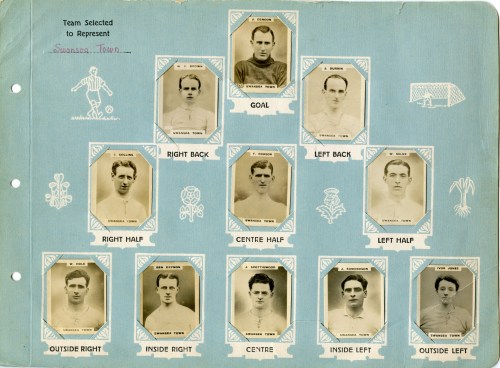
1920s Swansea Town Cigarette Cards
Before the Second World War, professional footballers’ contracts were limited to one year and there was a maximum wage in force. This prevented a wage war between clubs and ensured they were not lumbered with long-term costs for players they no longer wanted. It also meant every summer they was a set of new negotiations with players.
In 1927, the whole of Swansea Town first-team refused to sign new contracts after the directors tried to lower their wages by a pound a week and make up for it by a bonus scheme based on the number of games played.
The players stated they were objecting to the financial loss they would suffer if they were injured. They claimed they didn’t mind if they lost money if were dropped because of loss of form, although this was probably a sensible public statement to ensure they did not lose popular sympathy.
In an act of solidarity, those first-team players who the change did not affect because they were already on lower wages, also refused to re-sign. The squad seems to have chosen its moment carefully making the decision the week before the club was due to leave for a tour of Portugal and Spain.
Despite the strong position the players’ collective action put them in, they failed to secure what they wanted. The next day, the press reported that many of players had re-signed, although it was unclear on what terms. By the following day, only two players had not agreed terms.
The club had held out and won. Once some of the players had broken ranks and signed the others were vulnerable. In the days of strict contract constraints, the only thing players had on their side was collective unity and that was not easy to achieve in the lower divisions where everyone was replaceable.
Sources: South Wales Echo, 5-7 May 1927.
Pen pictures of some of Swansea’s greatest players
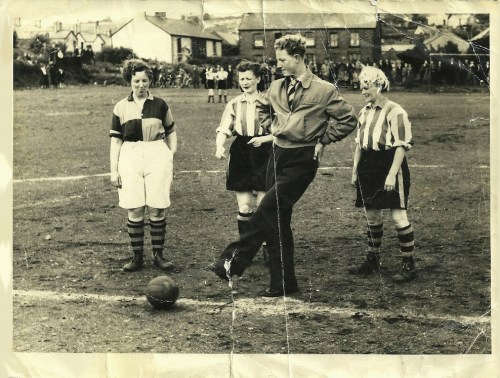
Ivor Allchurch kicks off a coronation women’s football match 1953
Pen pictures of some of Swansea’s greatest players from the project’s museum exhibition.
Filed under players
Swansea Town invite applications from 1st class players (1923)
In the days before extensive coaching networks, you could always advertise for new players. That’s what the Swans did in 1923 and here’s an ad the club placed in the Athletic News, a paper with close ties to the Football League, on 14 May 1923.
In this era, clubs retained a player’s registration even if their contract had expired and they were no longer being paid. The ad thus asks about the transfer fee a player’s previous club might expect. In practice, not many clubs did retain players’ registrations and demand fees for players they were not paying. If word got around, that a club made it difficult for any player to move on after his contract expired, then finding new players might be difficult.
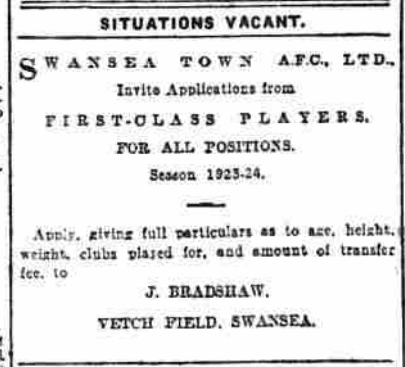
Memories from Rob Blades
Click on the images to enlarge.
Stories about Tony Millington’s testimonial and the infamous 2003 great escape game against Hull City.
Golden boy kicks off coronation event
 An appropriate item previously published in a match-day programme: during this Jubilee year, we can look back 60 years to the Coronation to catch a glimpse of Swans’ royalty.
An appropriate item previously published in a match-day programme: during this Jubilee year, we can look back 60 years to the Coronation to catch a glimpse of Swans’ royalty.
With Newcastle United in town, it’s the perfect time to unveil a rare
photograph of the legendary Ivor Allchurch. Known affectionately as the ‘Golden Boy’, Ivor is widely regarded as Swansea’s finest post-war footballer. Signing professional at the Vetch Field in May 1947, the Welsh international inside-forward was leading marksman three times for the Swans before moving to Newcastle United in October 1958 for £28,000 plus Reg Davies. Awarded the MBE, he later worked as a storeman and died in Swansea in May 1997.
Lifelong Swans supporter Steve Meredith sent us the photo on behalf of
his mother, Veronica Meredith. Ivor is pictured kicking off a celebration match for the Coronation of Queen Elizabeth in 1952 on ‘The Black Road’ which is now the Cwm Level pitches and a stone’s throw away from the Liberty Stadium.
Steve said: “He agreed to kick off the celebrations as he was a
Landore boy. He lived in Landeg Street next to where my mother lived
and knew everyone there. My mother lived right behind the Coopers pub
which is still there today. My gran Marie Grey is in the picture (left) and the two other ladies are May Leach and Mrs Fitzgerald.”
Ivor made 445 appearances and scored 164 goals for Swansea City, as
well as gaining 68 caps for Wales and scoring 23 goals at
international level. He starred for Newcastle between 1958 and 1962,
making 143 league appearances with 46 goals. Sir Matt Busby once said that Ivor never needed a number on his back for identification because his polish and class could not be missed. He said he was up there with the greatest players of all time, yet had the modesty that became him.
Filed under 1950s, players, Uncategorized
Lee Trundle
By Rhys Buckney
When you talk about legends at a club, they normally display loyalty, outstanding quality and a connection with the fans, Lee Trundle had all of this and more. He was an icon, the first of its kind in these parts, especially for a kid who grew up in the 1990’s when supporting the Swans wasn’t as popular as it has become with success. We were brought up on stories of Alan Curtis and Ivor Allchurch, but had experienced a distinct lack of anyone who had this sort of hero worship amongst fans. Then ‘magic daps’ arrived.
There was an air of optimism surrounding pre-season, we had just stayed up on the final day on the previous season in that unforgettable thriller against Hull, and done it playing some fantastic attacking football. Brian Flynn would implement this style by bringing in youngsters such as Leon Britton and Alan Tate who are still club heroes, and more experienced heads like Roberto Martinez, who would become a future manager and later, a figure of much controversy. Trundle had played under Flynn at Wrexham and despite him celebrating a promotion to Division 2 (League 1), he took the gamble to move to South Wales to link up with him again in a move that would change Swansea City forever.
Embed from Getty ImagesHe started relatively slow for someone who would soon earn and give credit to the loving nickname ‘magic daps’, bagging a rare header against Bury in a 4-2 win. He really announced himself onto the stage though in a following match against Cheltenham. We were losing 3-1, when suddenly the match became the Lee Trundle show grabbing himself a second half hat-trick. Many players in circumstances such as this throw the old cliché ‘there’s more to come’, and having suffered as a Swans fan you’d be forgiven for taking this with a pinch of salt, but he was a man of his word.
Embed from Getty ImagesTrundlemania would soon sweep Swansea taking us on a cup run to the 5th round including a thrilling 2-1 win against Preston North End in which of course he claimed the winner. A season of highlights saw him propelled into the spotlight through Soccer AM who took note of his enigmatic skills after the audacious shoulder roll against Huddersfield Town which saw Peter Jackson lose his cool and the plot. Although promotion wasn’t achieved, our new hero had truly arrived. Following seasons would see him sign an image deal with the Swans because over 60% of our sales were Trundle merchandise and his own LT10 clothing line.
Having turned down the opportunity previously to join Sheffield Wednesday when subject of a £750,000 bid, he needed to grab his chance.Bristolcame in with a record £1,000,000 bid for our star striker, who left with a heavy heart, but for the right reasons. He didn’t leave for the money, he left to try himself as high as he possibly could, and nobody could deny him that right.
The move didn’t work out, and he finds himself living locally now, a true testament to a man who was as much of a jack as anybody born in the city. For it was not just the goals, it was everything, it was him. He made time for all the fans, regardless of age, suddenly young boys in Swansea were getting the ‘Lee Trundle haircut’, wearing his boots, and even his signature wrist sweatbands. He was an icon in every sense of the word.
He bonded with the fans, and would have not been out of place if thrown in the North Bank. Stories circulated about him doing this good deed or that, and I personally witnessed him turning up to Ashleigh Road playing fields randomly alone to have a kick around with the children who were playing football there. The matches being played suddenly became a sideshow. He was never too busy for the fan, and his autobiography expresses all this and more.
For me, Lee Trundle will always be the very best, he propelled us to where we are now, yes he missed out on the last ride, but he began it all, without him, we could easily be languishing in League 2. A true Swansea hero.
Alan Davies (d. 4 February 1992)
I have been reminded that Alan Davies died twenty years ago today when, tragically, he took his own life at the age of 30. An elegent and creative midfielder, Alan made 127 appearances for the Swans in two spells at the club between 1987 and 1992. He began his career at Manchester United, for whom he appeared in the two games of the FA Cup Final v Brighton in 1983 , and he went on to play for Newcastle United. He won 13 Welsh caps. Alan’s death was a great blow to the club and its supporters, as well as to his family and friends, and it was entirely fitting and appropriate that a benefit game was played against Manchester United at the Vetch on 11 August 1992. As the note in the benefit match programme states, he was a very popular player who was much missed by many people connected with the club.
Roy Evans and Brian Purcell RIP
Forty-three years ago today, two former Swans players Roy Evans and Brian Purcell were killed in a car crash on the Heads of the Valley road while en route to a game for their club Hereford United.
Players’ memories of the Vetch
It’s a fantastic place to be, especially when you are part of a winning team. When the crowd gets behind you it’s a wonderful atmosphere. It’s probably even better in evening games. The crowd is almost on top of you and you can almost hear someone ordering his pasty and tea. It has that kind of aura about it and teams do get intimidated when they come to the Vetch. [Colin Pascoe]
Night games hold it apart from any other ground. The atmosphere was always fantastic. Scoring at the Vetch was special. The fans on the North Bank always rushed forward and that was an unbelievable feeling. [John Williams]
As soon as you go out there the first thing you see is the fans on the North Bank. When it’s packed it’s an unbelievable feeling. [Lee Trundle]
It’s a hostile atmosphere. I have experienced both sides of it and I can guarantee it’s better to be a home player. [Roberto Martinez]
As a winger there is no better feeling than running down the flank in front of the North Bank. [Brad Maylett]
I spent many years on the gantry above the North Bank doing commentary. With the wind coming off the sea, it’s got to be the coldest place on earth. I won’t miss that. [Dai Davies]
Ivor Allchurch
 Extract from Percy Young, Football Year (1958), describing the writer’s first trip to a Swansea match. He had never seen Ivor play before, although he maintained he was not simply there to see the Swans star.
Extract from Percy Young, Football Year (1958), describing the writer’s first trip to a Swansea match. He had never seen Ivor play before, although he maintained he was not simply there to see the Swans star.
 Within three minutes of the whistle there was a goal. It was Allchurch’s goal. More than that it was the first goal of the new year in the Football League, the start of the battle being set half-an-hour in advance of any other on the same day. With expectations previously aroused, and the circumstances of the goal as they were, it was clear that our hero was peerless. The papers were correct. Allchurch was the finest inside forward in the game. We were at one with our neighbours in the stand – excepting some who came from Newport and illogically supported West Ham. The calmer afterthoughts of half-time, however, brought to mind the close relationship between the miraculous and the merely fortuitous.
Within three minutes of the whistle there was a goal. It was Allchurch’s goal. More than that it was the first goal of the new year in the Football League, the start of the battle being set half-an-hour in advance of any other on the same day. With expectations previously aroused, and the circumstances of the goal as they were, it was clear that our hero was peerless. The papers were correct. Allchurch was the finest inside forward in the game. We were at one with our neighbours in the stand – excepting some who came from Newport and illogically supported West Ham. The calmer afterthoughts of half-time, however, brought to mind the close relationship between the miraculous and the merely fortuitous.
It had been this way. Allchurch receiving the ball just beyond the half-way line veered north-eastward, feinting the while. Ten yards from the corner flag the position was without hope. A posse of defenders harassed, and to contrive a neat, carefully pointed pass appeared as impossible as to outwit, single-footed, so many claret-coloured men, whose vigour at least could earn no reproach. Suddenly the right foot was swung. The ball lifted and, wind-swept, went directly and certainly into the distant net.
Was it the single, unmistakable sign of genius, or was it that a speculative ball meant for a hesitant colleague at centre-forward, or for the admirably adventurous Mervyn Charles, marauding to purpose from wing-half, had missed its intention? The answer lies elsewhere and will never, perhaps, be known.
You can read Ivor’s obituary from The Independent here.
Remember Walter Boyd?
There are players you remember because they were great and there are players you remember because they were rubbish. Then there are the players who we remember because they were different. Walter Boyd was one of those.
Embed from Getty ImagesHe joined Swansea in 1999 in something of a blaze of publicity. There were claims we had signed a player way above our basement-division station and that he was cult hero in his native Jamaica. More verifiable was the fact he’d made three substitute appearances in the 1998 World Cup and his 30 odd international goals (although the papers didn’t agree quite how many he’d scored).
He was given the number 35 shirt because this was the number of goals he was aiming to score, a figure that would equal the club record held by Cyril Pearce, a player better known to most of us for giving his name to our then new mascot. Few believed the hype. We’d heard all before and it was coming from a team of directors who were not exactly trusted or flavour of the month.
Boyd made his debut against Rotherham in a cold evening game and scored twice in a 2-0 win. The first was a straight forward affair but the second was a long range curler into the top corner. Or at least that’s how it looked from the far end of the North Bank. It seemed as though the Messiah had arrived, even if he did look rather bewildered by where he’d ended up.
A few more followed in subsequent games but then straight after coming on as a sub against Darlington he elbowed someone before play had even resumed. He’d been on the pitch for a matter of seconds and there was talk that it was the fastest red card ever.
After that things went into decline. The team was doing well, grinding out the load of 1-0 wins that would eventually bring the title but Boyd seemed to find life in Division Three difficult. To fans it seemed as if Boyd was not quite part of the team and sometimes not quite part of the match. He often seemed to be watching play going on around him.
But Boyd was more memorable for the debates about race he started. His colour was inescapable and his nickname back home was apparently Blacka Pearl. He wasn’t the first black player to turn out for the Swans but he must have been the first black player who wasn’t from the UK. Mike Lewis, the club’s general manager, even claimed that Boyd’s arrival could help solve some of the problems with racism that the club was experiencing from a few supporters.
On his debut the old boy who stood next to me on the North Bank jokingly said that should the floodlights fail we would only be able to see Walter’s eyes. This was a joke but some got quite uncomfortable with the way their mates spoke about Boyd. There was a lot of talk that he couldn’t hack a Welsh winter. That was an old cliché that was applied to black players throughout the 70s and 80s and it was often held up to be an example of racial stereotyping. But in Walter’s case it seemed to be true and he even said so in the press himself. But that didn’t stop talk in the pubs and online about whether the comments about Boyd were just because of the colour of the skin. Furthermore, some people weren’t sure whether to call him black or coloured. Quite simply, his presence created debates about what racism was.
Things weren’t made any more comfortable by fans from Jamaica going online and writing defences of Boyd in what seemed to be a parody of Caribbean speech. Perhaps they were genuine, perhaps they were wind ups. It was impossible to tell but they were replicated by Swans supporters unimpressed with Boyd and the team in general.
Boyd ended up being somewhat peripheral to the team’s success in winning the league that year. Being less effective up front than Julian Alsop or Steve Watkin didn’t quite match what we were told to expect when he arrived. The next season he was injured a lot of the time and the team got relegated. He only scored three goals that season and no one was surprised or too sorry to see him go. But Walter still deserves his place in Swansea City history. There aren’t many players in the club’s history who suddenly won us a following in Jamaica.
Martin Johnes
Training 1920s-style
In the 1920s training wasn’t quite what it is today. A series of different baths was considered excellent preparation for a cup tie, as this 1926 Evening Post cartoon shows. Click on it to enlarge.
Some ‘Don’ts’ for players, directors & fans from 1912
This is the advice The Cambrian newspaper (13 September 1912) gave to the new Swansea Town when reporting the club’s first ever match. Somethings don’t change much!
To players
Don’t lose your temper; loss of temper means loss of form, and sometimes the match.
Don’t play to the gallery. Goals count, not pattern weaving.
To Directors
Don’t be too hasty in putting up prices. It often cuts down the average attendance.
Don’t forget that players are human beings, not machines.
To Spectators
Don’t think your team is the only one that can play a clever game. There are others.
Don’t desert your team when they strike a bad match. That’s when they want your encouragement most.
Don’t blame the referee for your defeats. Take them as men.
Don’t go to see one team play. It takes two sides to provide your sport. Give them both a share of your cheering.
Filed under 1910s, directors, fans, newspapers, players
Players Revolt
In 1927 the whole of Swansea Town first-team refused to sign new contracts after the directors tried to lower their wages by a pound a week and make up for it by a bonus scheme based on the number of games played.
The players said they were objecting to the financial harm they would suffer if they were injured. They also claimed they did not mind if they suffered financially through losing their first-team place because of form, although this was probably a sensible public statement to ensure they did not lose popular sympathy.
In an act of solidarity, the first-team players who the change did not affect, because they were already on lower wages, also refused to re-sign. The players seem to have chosen their moment carefully, making their decision the week before the club was due to leave for a tour of Portugal and Spain.
Yet, despite the strong position the players’ collective action put them in, they failed to secure what they wanted. The next day it was reported that many of players had signed, although it was unclear on what terms. By the following day only two players had not agreed terms. The club had held out and won. Once some of the players had broken ranks and signed, the others were vulnerable and ultimately replaceable.

